Report: Improving Wellbeing for International Students in Australia
VerifiedAdded on 2023/01/23
|10
|2151
|52
Report
AI Summary
This report delves into strategies to enhance the wellbeing of international students in Australia. It examines the stressors they face, including language barriers, culture shock, lack of empathy, and financial constraints. The report highlights the importance of emotional intelligence, social adaptation, and university support in mitigating these challenges. It also emphasizes the role of positive coping styles and recommends that Australian universities cultivate cultural competence among staff and students, provide comprehensive support services, and assess student coping mechanisms. The report concludes that by implementing these strategies, universities can foster a more supportive environment for international students, leading to improved academic outcomes and overall wellbeing. The report also references several key studies and articles to support its findings.
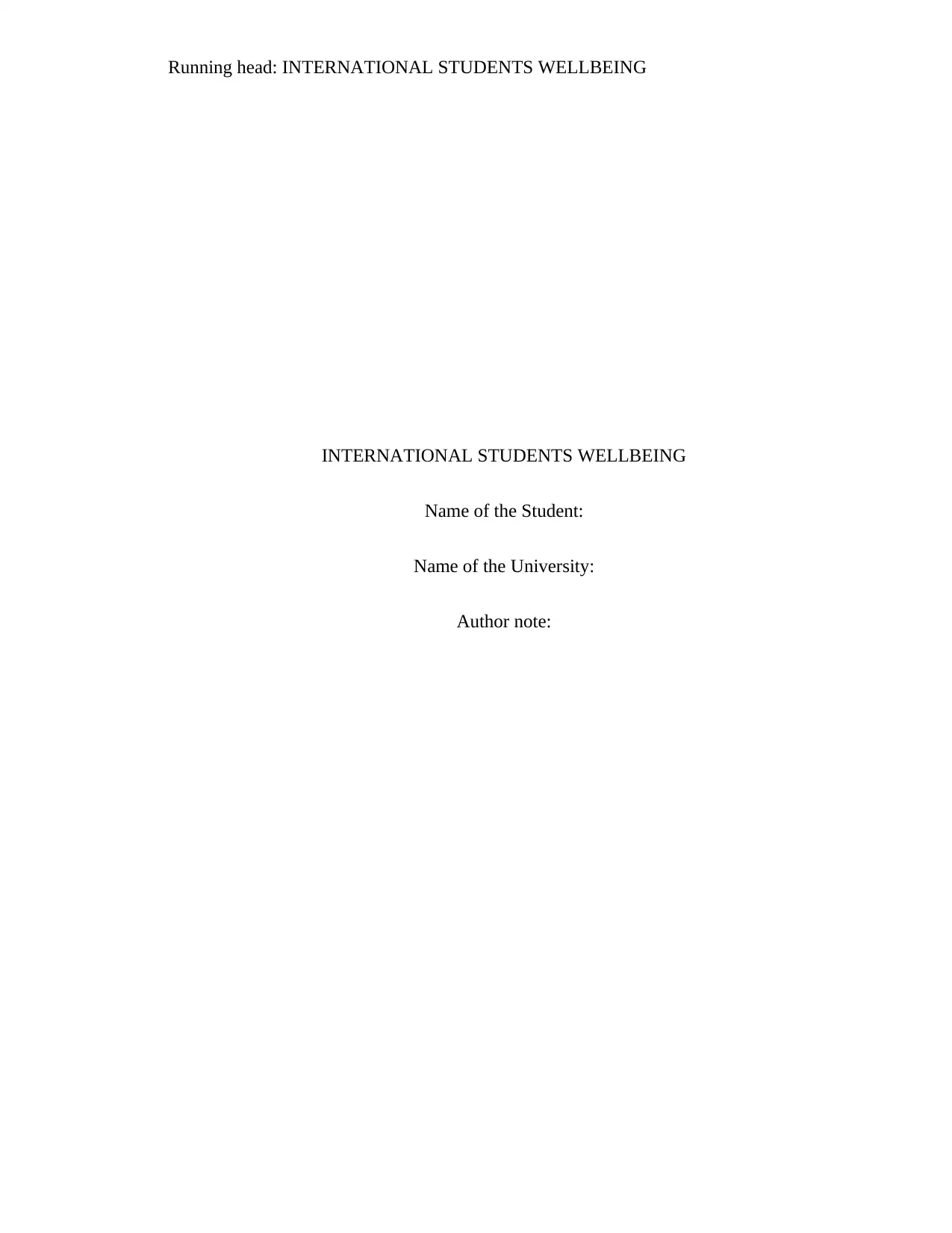
Running head: INTERNATIONAL STUDENTS WELLBEING
INTERNATIONAL STUDENTS WELLBEING
Name of the Student:
Name of the University:
Author note:
INTERNATIONAL STUDENTS WELLBEING
Name of the Student:
Name of the University:
Author note:
Paraphrase This Document
Need a fresh take? Get an instant paraphrase of this document with our AI Paraphraser
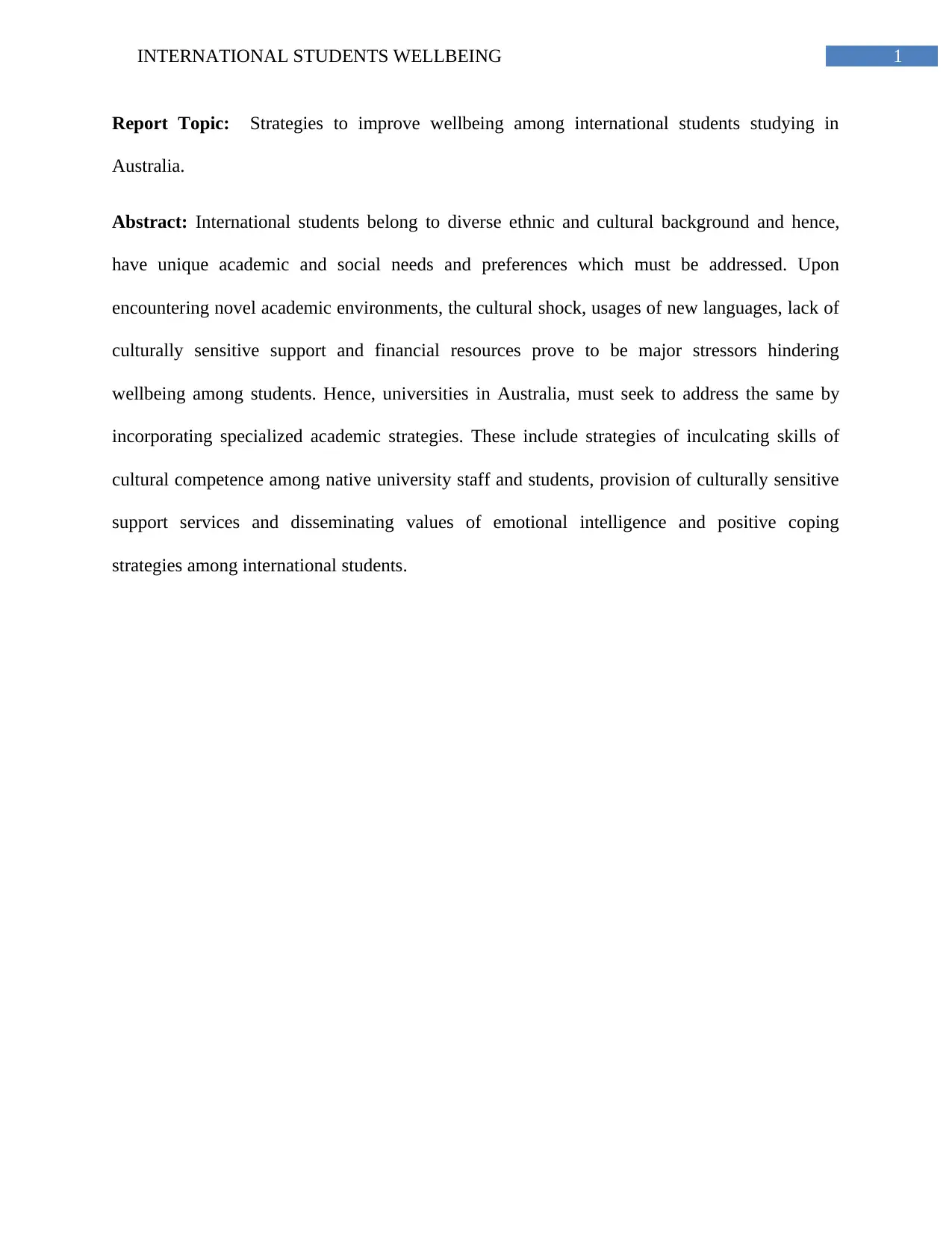
1INTERNATIONAL STUDENTS WELLBEING
Report Topic: Strategies to improve wellbeing among international students studying in
Australia.
Abstract: International students belong to diverse ethnic and cultural background and hence,
have unique academic and social needs and preferences which must be addressed. Upon
encountering novel academic environments, the cultural shock, usages of new languages, lack of
culturally sensitive support and financial resources prove to be major stressors hindering
wellbeing among students. Hence, universities in Australia, must seek to address the same by
incorporating specialized academic strategies. These include strategies of inculcating skills of
cultural competence among native university staff and students, provision of culturally sensitive
support services and disseminating values of emotional intelligence and positive coping
strategies among international students.
Report Topic: Strategies to improve wellbeing among international students studying in
Australia.
Abstract: International students belong to diverse ethnic and cultural background and hence,
have unique academic and social needs and preferences which must be addressed. Upon
encountering novel academic environments, the cultural shock, usages of new languages, lack of
culturally sensitive support and financial resources prove to be major stressors hindering
wellbeing among students. Hence, universities in Australia, must seek to address the same by
incorporating specialized academic strategies. These include strategies of inculcating skills of
cultural competence among native university staff and students, provision of culturally sensitive
support services and disseminating values of emotional intelligence and positive coping
strategies among international students.
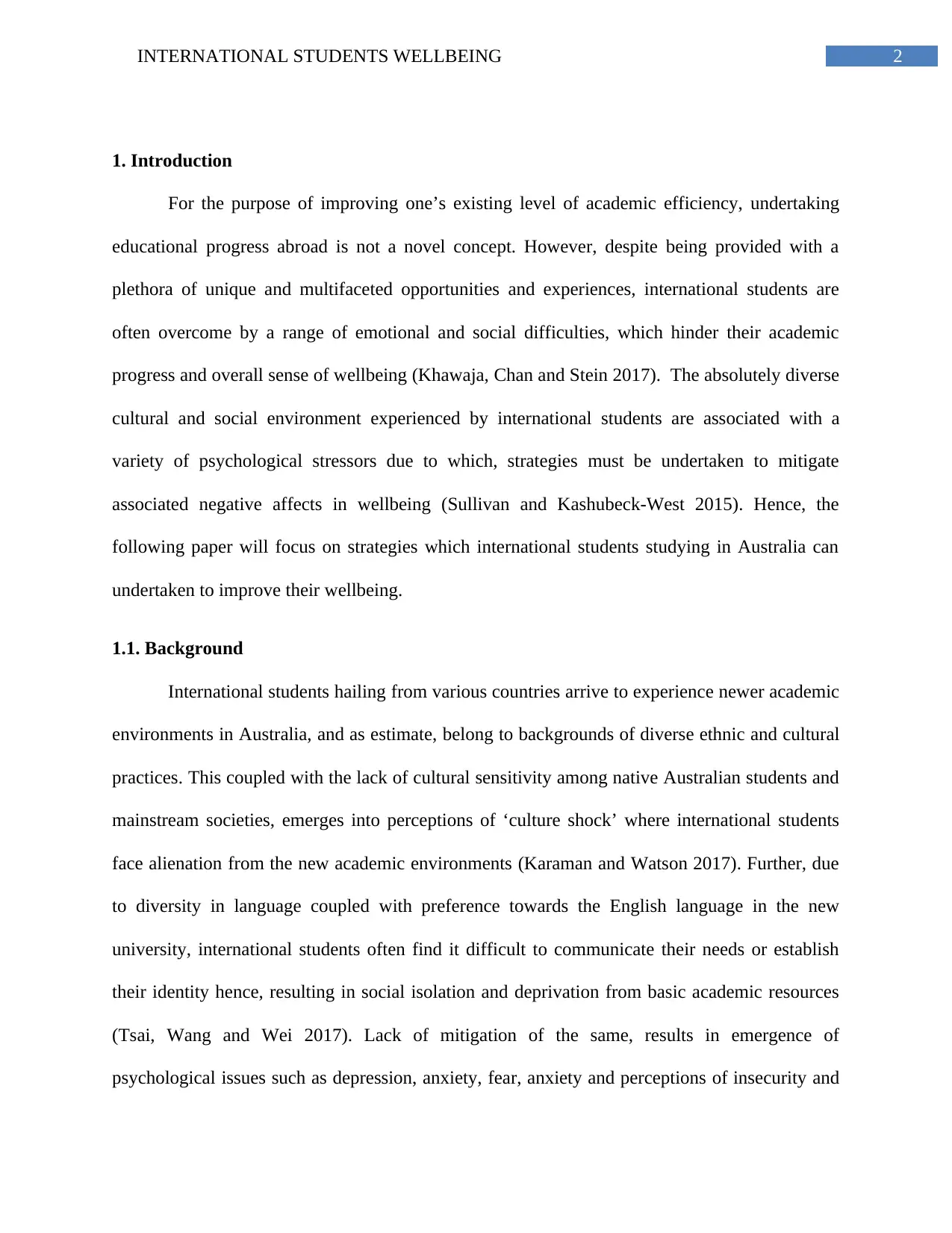
2INTERNATIONAL STUDENTS WELLBEING
1. Introduction
For the purpose of improving one’s existing level of academic efficiency, undertaking
educational progress abroad is not a novel concept. However, despite being provided with a
plethora of unique and multifaceted opportunities and experiences, international students are
often overcome by a range of emotional and social difficulties, which hinder their academic
progress and overall sense of wellbeing (Khawaja, Chan and Stein 2017). The absolutely diverse
cultural and social environment experienced by international students are associated with a
variety of psychological stressors due to which, strategies must be undertaken to mitigate
associated negative affects in wellbeing (Sullivan and Kashubeck-West 2015). Hence, the
following paper will focus on strategies which international students studying in Australia can
undertaken to improve their wellbeing.
1.1. Background
International students hailing from various countries arrive to experience newer academic
environments in Australia, and as estimate, belong to backgrounds of diverse ethnic and cultural
practices. This coupled with the lack of cultural sensitivity among native Australian students and
mainstream societies, emerges into perceptions of ‘culture shock’ where international students
face alienation from the new academic environments (Karaman and Watson 2017). Further, due
to diversity in language coupled with preference towards the English language in the new
university, international students often find it difficult to communicate their needs or establish
their identity hence, resulting in social isolation and deprivation from basic academic resources
(Tsai, Wang and Wei 2017). Lack of mitigation of the same, results in emergence of
psychological issues such as depression, anxiety, fear, anxiety and perceptions of insecurity and
1. Introduction
For the purpose of improving one’s existing level of academic efficiency, undertaking
educational progress abroad is not a novel concept. However, despite being provided with a
plethora of unique and multifaceted opportunities and experiences, international students are
often overcome by a range of emotional and social difficulties, which hinder their academic
progress and overall sense of wellbeing (Khawaja, Chan and Stein 2017). The absolutely diverse
cultural and social environment experienced by international students are associated with a
variety of psychological stressors due to which, strategies must be undertaken to mitigate
associated negative affects in wellbeing (Sullivan and Kashubeck-West 2015). Hence, the
following paper will focus on strategies which international students studying in Australia can
undertaken to improve their wellbeing.
1.1. Background
International students hailing from various countries arrive to experience newer academic
environments in Australia, and as estimate, belong to backgrounds of diverse ethnic and cultural
practices. This coupled with the lack of cultural sensitivity among native Australian students and
mainstream societies, emerges into perceptions of ‘culture shock’ where international students
face alienation from the new academic environments (Karaman and Watson 2017). Further, due
to diversity in language coupled with preference towards the English language in the new
university, international students often find it difficult to communicate their needs or establish
their identity hence, resulting in social isolation and deprivation from basic academic resources
(Tsai, Wang and Wei 2017). Lack of mitigation of the same, results in emergence of
psychological issues such as depression, anxiety, fear, anxiety and perceptions of insecurity and
⊘ This is a preview!⊘
Do you want full access?
Subscribe today to unlock all pages.

Trusted by 1+ million students worldwide
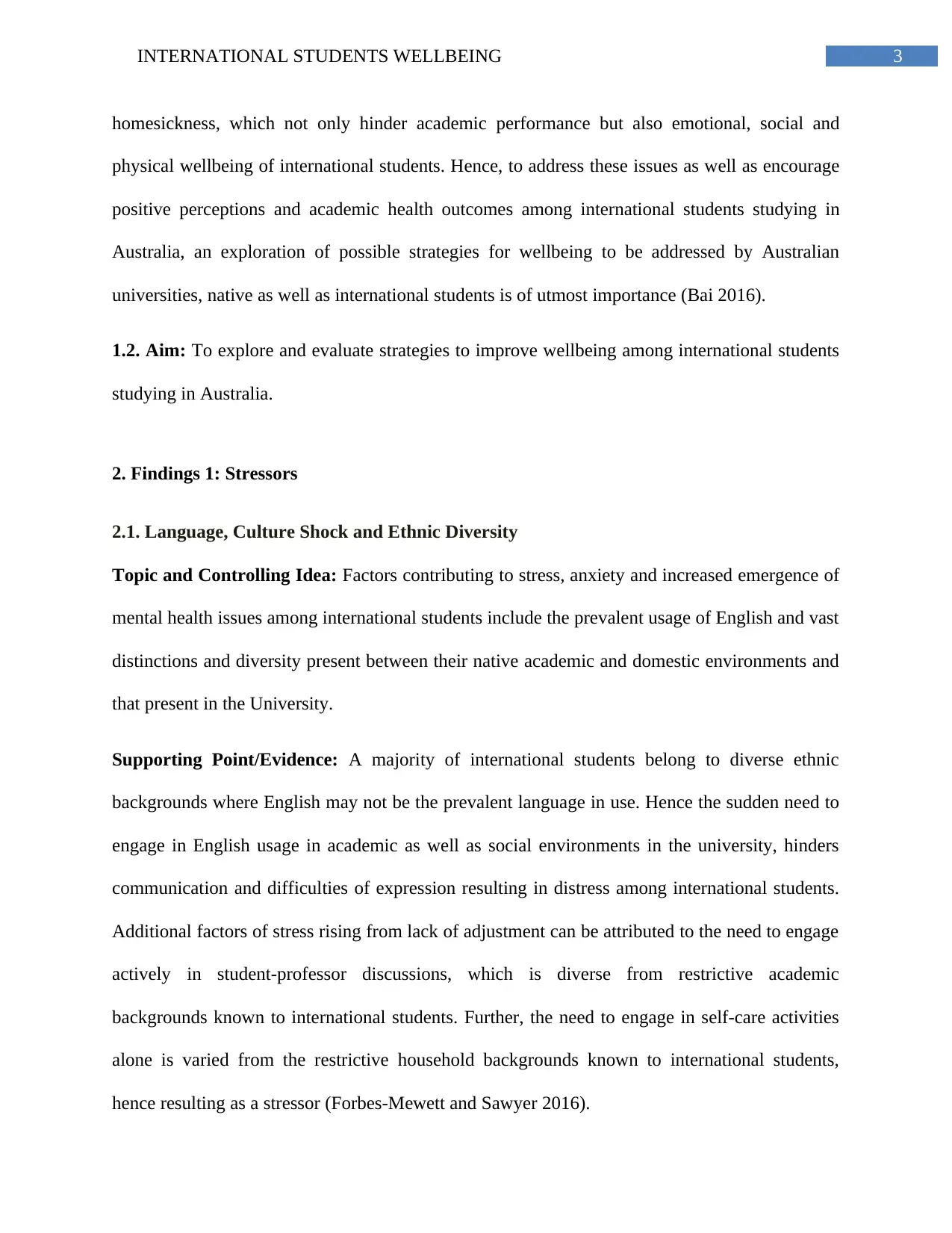
3INTERNATIONAL STUDENTS WELLBEING
homesickness, which not only hinder academic performance but also emotional, social and
physical wellbeing of international students. Hence, to address these issues as well as encourage
positive perceptions and academic health outcomes among international students studying in
Australia, an exploration of possible strategies for wellbeing to be addressed by Australian
universities, native as well as international students is of utmost importance (Bai 2016).
1.2. Aim: To explore and evaluate strategies to improve wellbeing among international students
studying in Australia.
2. Findings 1: Stressors
2.1. Language, Culture Shock and Ethnic Diversity
Topic and Controlling Idea: Factors contributing to stress, anxiety and increased emergence of
mental health issues among international students include the prevalent usage of English and vast
distinctions and diversity present between their native academic and domestic environments and
that present in the University.
Supporting Point/Evidence: A majority of international students belong to diverse ethnic
backgrounds where English may not be the prevalent language in use. Hence the sudden need to
engage in English usage in academic as well as social environments in the university, hinders
communication and difficulties of expression resulting in distress among international students.
Additional factors of stress rising from lack of adjustment can be attributed to the need to engage
actively in student-professor discussions, which is diverse from restrictive academic
backgrounds known to international students. Further, the need to engage in self-care activities
alone is varied from the restrictive household backgrounds known to international students,
hence resulting as a stressor (Forbes-Mewett and Sawyer 2016).
homesickness, which not only hinder academic performance but also emotional, social and
physical wellbeing of international students. Hence, to address these issues as well as encourage
positive perceptions and academic health outcomes among international students studying in
Australia, an exploration of possible strategies for wellbeing to be addressed by Australian
universities, native as well as international students is of utmost importance (Bai 2016).
1.2. Aim: To explore and evaluate strategies to improve wellbeing among international students
studying in Australia.
2. Findings 1: Stressors
2.1. Language, Culture Shock and Ethnic Diversity
Topic and Controlling Idea: Factors contributing to stress, anxiety and increased emergence of
mental health issues among international students include the prevalent usage of English and vast
distinctions and diversity present between their native academic and domestic environments and
that present in the University.
Supporting Point/Evidence: A majority of international students belong to diverse ethnic
backgrounds where English may not be the prevalent language in use. Hence the sudden need to
engage in English usage in academic as well as social environments in the university, hinders
communication and difficulties of expression resulting in distress among international students.
Additional factors of stress rising from lack of adjustment can be attributed to the need to engage
actively in student-professor discussions, which is diverse from restrictive academic
backgrounds known to international students. Further, the need to engage in self-care activities
alone is varied from the restrictive household backgrounds known to international students,
hence resulting as a stressor (Forbes-Mewett and Sawyer 2016).
Paraphrase This Document
Need a fresh take? Get an instant paraphrase of this document with our AI Paraphraser
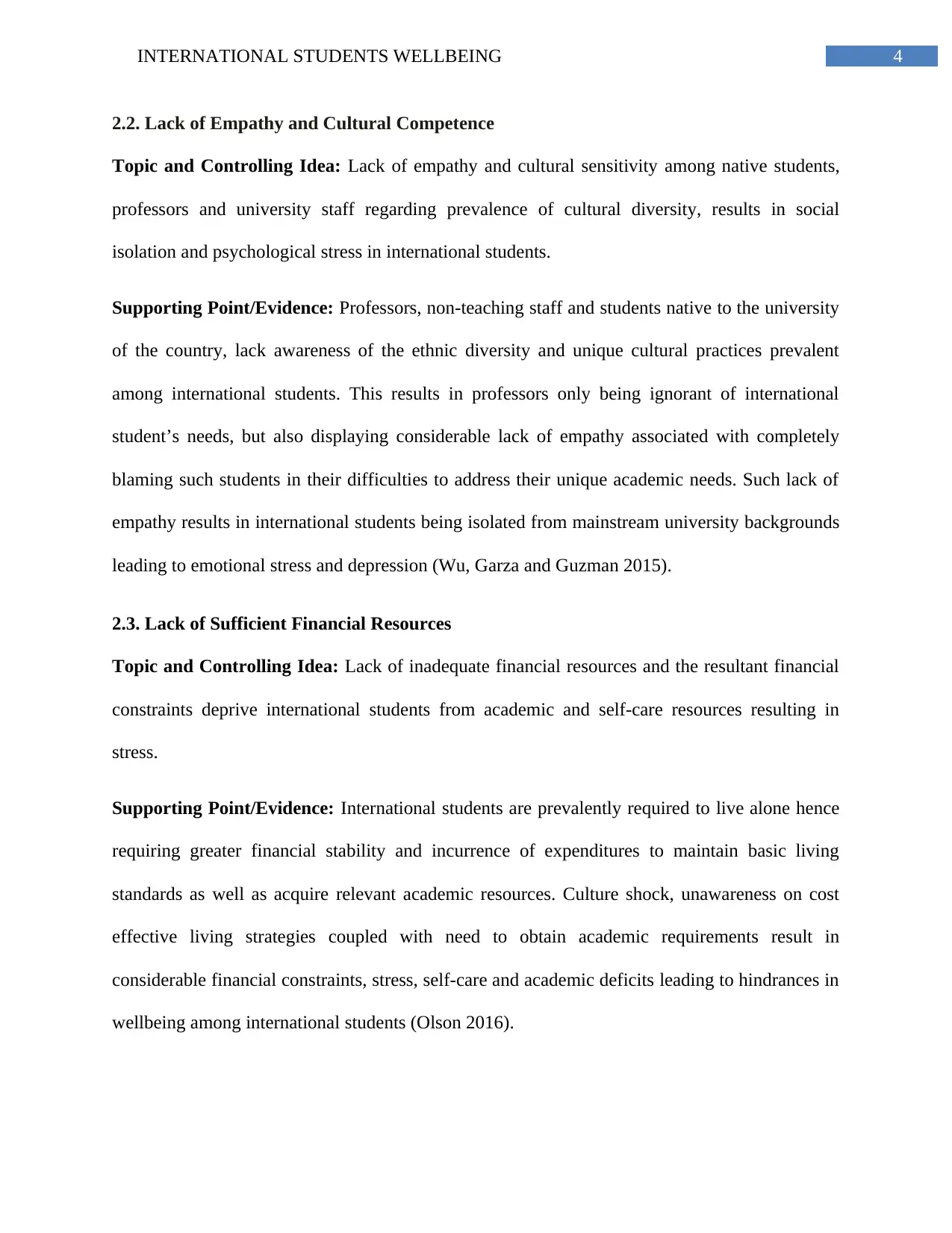
4INTERNATIONAL STUDENTS WELLBEING
2.2. Lack of Empathy and Cultural Competence
Topic and Controlling Idea: Lack of empathy and cultural sensitivity among native students,
professors and university staff regarding prevalence of cultural diversity, results in social
isolation and psychological stress in international students.
Supporting Point/Evidence: Professors, non-teaching staff and students native to the university
of the country, lack awareness of the ethnic diversity and unique cultural practices prevalent
among international students. This results in professors only being ignorant of international
student’s needs, but also displaying considerable lack of empathy associated with completely
blaming such students in their difficulties to address their unique academic needs. Such lack of
empathy results in international students being isolated from mainstream university backgrounds
leading to emotional stress and depression (Wu, Garza and Guzman 2015).
2.3. Lack of Sufficient Financial Resources
Topic and Controlling Idea: Lack of inadequate financial resources and the resultant financial
constraints deprive international students from academic and self-care resources resulting in
stress.
Supporting Point/Evidence: International students are prevalently required to live alone hence
requiring greater financial stability and incurrence of expenditures to maintain basic living
standards as well as acquire relevant academic resources. Culture shock, unawareness on cost
effective living strategies coupled with need to obtain academic requirements result in
considerable financial constraints, stress, self-care and academic deficits leading to hindrances in
wellbeing among international students (Olson 2016).
2.2. Lack of Empathy and Cultural Competence
Topic and Controlling Idea: Lack of empathy and cultural sensitivity among native students,
professors and university staff regarding prevalence of cultural diversity, results in social
isolation and psychological stress in international students.
Supporting Point/Evidence: Professors, non-teaching staff and students native to the university
of the country, lack awareness of the ethnic diversity and unique cultural practices prevalent
among international students. This results in professors only being ignorant of international
student’s needs, but also displaying considerable lack of empathy associated with completely
blaming such students in their difficulties to address their unique academic needs. Such lack of
empathy results in international students being isolated from mainstream university backgrounds
leading to emotional stress and depression (Wu, Garza and Guzman 2015).
2.3. Lack of Sufficient Financial Resources
Topic and Controlling Idea: Lack of inadequate financial resources and the resultant financial
constraints deprive international students from academic and self-care resources resulting in
stress.
Supporting Point/Evidence: International students are prevalently required to live alone hence
requiring greater financial stability and incurrence of expenditures to maintain basic living
standards as well as acquire relevant academic resources. Culture shock, unawareness on cost
effective living strategies coupled with need to obtain academic requirements result in
considerable financial constraints, stress, self-care and academic deficits leading to hindrances in
wellbeing among international students (Olson 2016).
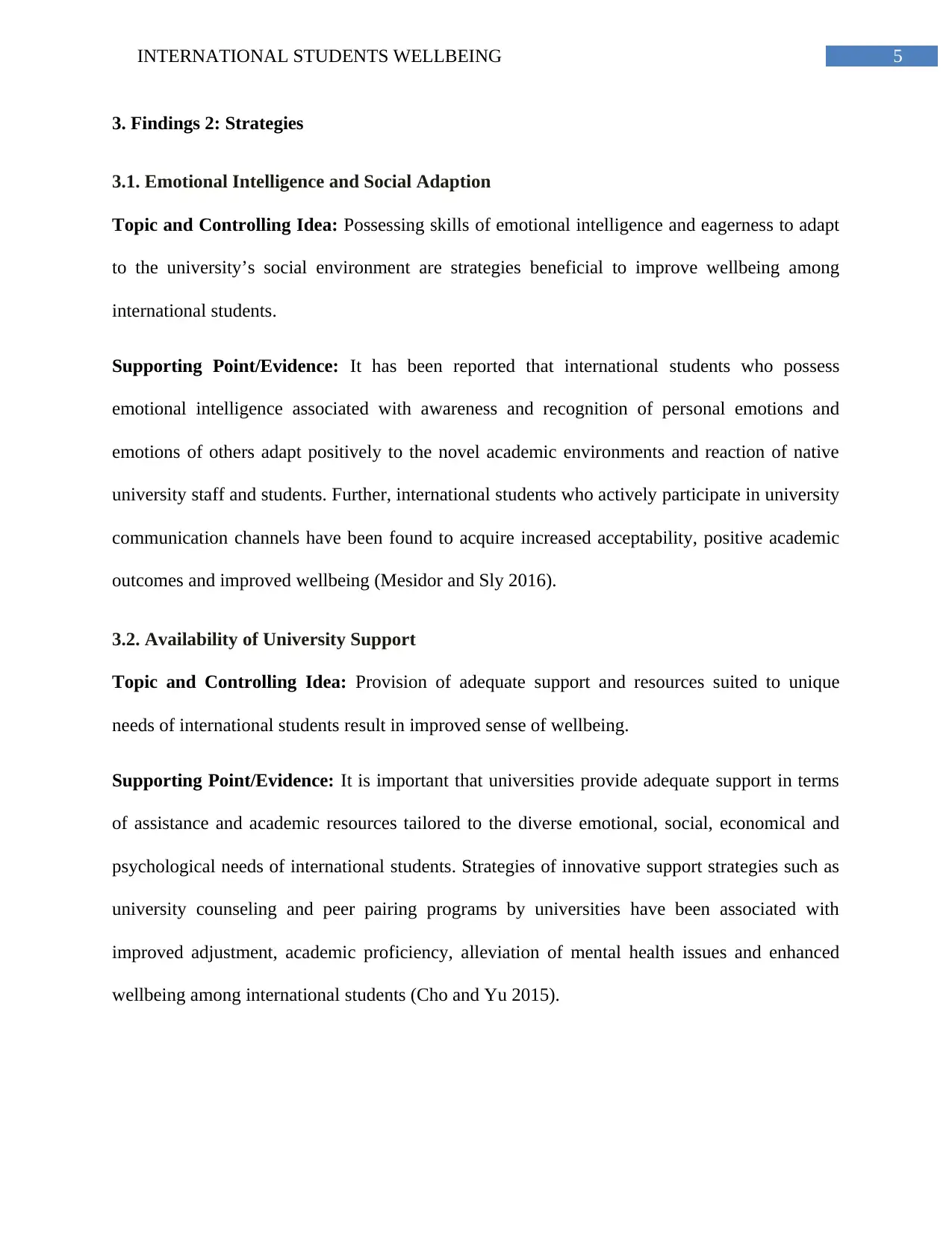
5INTERNATIONAL STUDENTS WELLBEING
3. Findings 2: Strategies
3.1. Emotional Intelligence and Social Adaption
Topic and Controlling Idea: Possessing skills of emotional intelligence and eagerness to adapt
to the university’s social environment are strategies beneficial to improve wellbeing among
international students.
Supporting Point/Evidence: It has been reported that international students who possess
emotional intelligence associated with awareness and recognition of personal emotions and
emotions of others adapt positively to the novel academic environments and reaction of native
university staff and students. Further, international students who actively participate in university
communication channels have been found to acquire increased acceptability, positive academic
outcomes and improved wellbeing (Mesidor and Sly 2016).
3.2. Availability of University Support
Topic and Controlling Idea: Provision of adequate support and resources suited to unique
needs of international students result in improved sense of wellbeing.
Supporting Point/Evidence: It is important that universities provide adequate support in terms
of assistance and academic resources tailored to the diverse emotional, social, economical and
psychological needs of international students. Strategies of innovative support strategies such as
university counseling and peer pairing programs by universities have been associated with
improved adjustment, academic proficiency, alleviation of mental health issues and enhanced
wellbeing among international students (Cho and Yu 2015).
3. Findings 2: Strategies
3.1. Emotional Intelligence and Social Adaption
Topic and Controlling Idea: Possessing skills of emotional intelligence and eagerness to adapt
to the university’s social environment are strategies beneficial to improve wellbeing among
international students.
Supporting Point/Evidence: It has been reported that international students who possess
emotional intelligence associated with awareness and recognition of personal emotions and
emotions of others adapt positively to the novel academic environments and reaction of native
university staff and students. Further, international students who actively participate in university
communication channels have been found to acquire increased acceptability, positive academic
outcomes and improved wellbeing (Mesidor and Sly 2016).
3.2. Availability of University Support
Topic and Controlling Idea: Provision of adequate support and resources suited to unique
needs of international students result in improved sense of wellbeing.
Supporting Point/Evidence: It is important that universities provide adequate support in terms
of assistance and academic resources tailored to the diverse emotional, social, economical and
psychological needs of international students. Strategies of innovative support strategies such as
university counseling and peer pairing programs by universities have been associated with
improved adjustment, academic proficiency, alleviation of mental health issues and enhanced
wellbeing among international students (Cho and Yu 2015).
⊘ This is a preview!⊘
Do you want full access?
Subscribe today to unlock all pages.

Trusted by 1+ million students worldwide
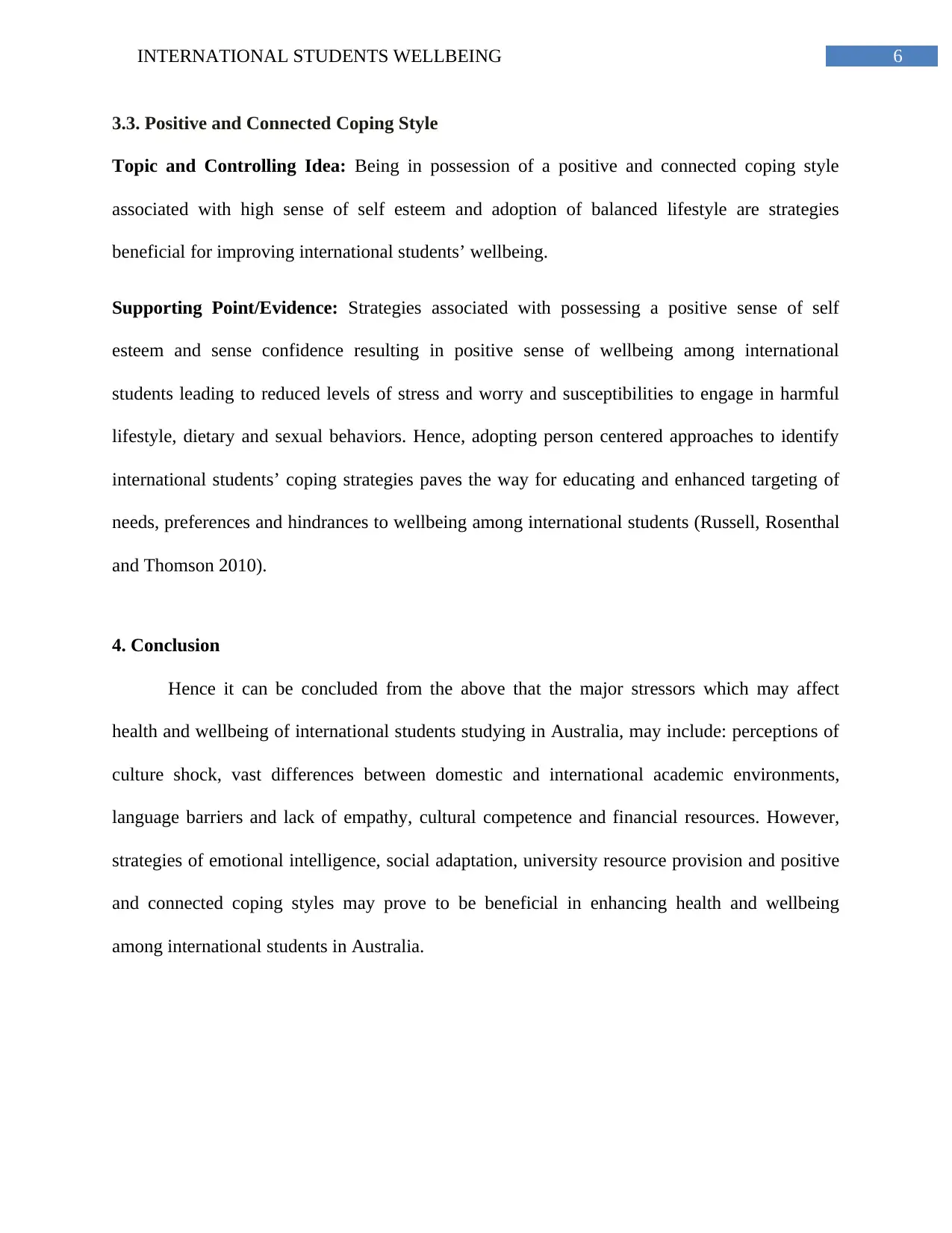
6INTERNATIONAL STUDENTS WELLBEING
3.3. Positive and Connected Coping Style
Topic and Controlling Idea: Being in possession of a positive and connected coping style
associated with high sense of self esteem and adoption of balanced lifestyle are strategies
beneficial for improving international students’ wellbeing.
Supporting Point/Evidence: Strategies associated with possessing a positive sense of self
esteem and sense confidence resulting in positive sense of wellbeing among international
students leading to reduced levels of stress and worry and susceptibilities to engage in harmful
lifestyle, dietary and sexual behaviors. Hence, adopting person centered approaches to identify
international students’ coping strategies paves the way for educating and enhanced targeting of
needs, preferences and hindrances to wellbeing among international students (Russell, Rosenthal
and Thomson 2010).
4. Conclusion
Hence it can be concluded from the above that the major stressors which may affect
health and wellbeing of international students studying in Australia, may include: perceptions of
culture shock, vast differences between domestic and international academic environments,
language barriers and lack of empathy, cultural competence and financial resources. However,
strategies of emotional intelligence, social adaptation, university resource provision and positive
and connected coping styles may prove to be beneficial in enhancing health and wellbeing
among international students in Australia.
3.3. Positive and Connected Coping Style
Topic and Controlling Idea: Being in possession of a positive and connected coping style
associated with high sense of self esteem and adoption of balanced lifestyle are strategies
beneficial for improving international students’ wellbeing.
Supporting Point/Evidence: Strategies associated with possessing a positive sense of self
esteem and sense confidence resulting in positive sense of wellbeing among international
students leading to reduced levels of stress and worry and susceptibilities to engage in harmful
lifestyle, dietary and sexual behaviors. Hence, adopting person centered approaches to identify
international students’ coping strategies paves the way for educating and enhanced targeting of
needs, preferences and hindrances to wellbeing among international students (Russell, Rosenthal
and Thomson 2010).
4. Conclusion
Hence it can be concluded from the above that the major stressors which may affect
health and wellbeing of international students studying in Australia, may include: perceptions of
culture shock, vast differences between domestic and international academic environments,
language barriers and lack of empathy, cultural competence and financial resources. However,
strategies of emotional intelligence, social adaptation, university resource provision and positive
and connected coping styles may prove to be beneficial in enhancing health and wellbeing
among international students in Australia.
Paraphrase This Document
Need a fresh take? Get an instant paraphrase of this document with our AI Paraphraser
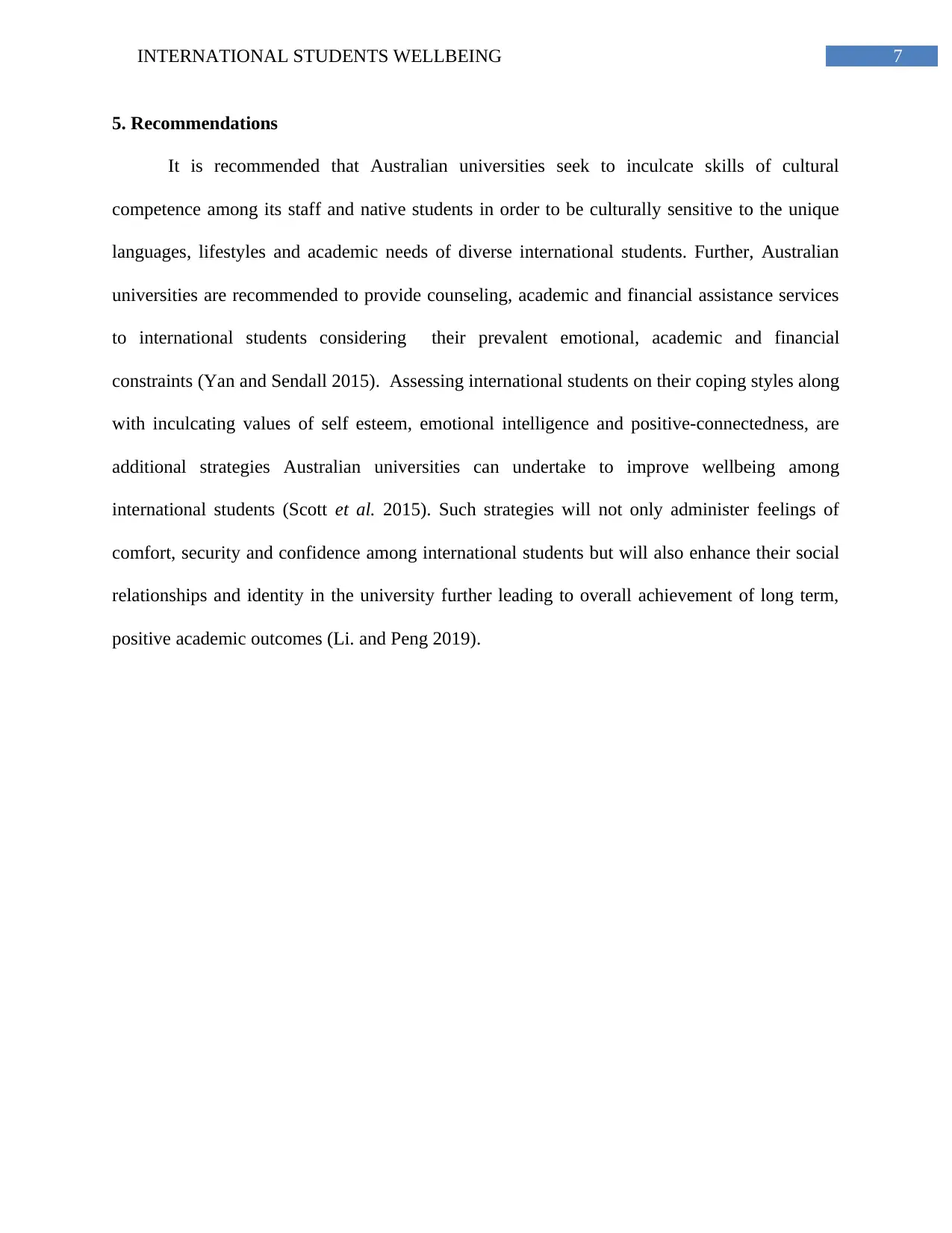
7INTERNATIONAL STUDENTS WELLBEING
5. Recommendations
It is recommended that Australian universities seek to inculcate skills of cultural
competence among its staff and native students in order to be culturally sensitive to the unique
languages, lifestyles and academic needs of diverse international students. Further, Australian
universities are recommended to provide counseling, academic and financial assistance services
to international students considering their prevalent emotional, academic and financial
constraints (Yan and Sendall 2015). Assessing international students on their coping styles along
with inculcating values of self esteem, emotional intelligence and positive-connectedness, are
additional strategies Australian universities can undertake to improve wellbeing among
international students (Scott et al. 2015). Such strategies will not only administer feelings of
comfort, security and confidence among international students but will also enhance their social
relationships and identity in the university further leading to overall achievement of long term,
positive academic outcomes (Li. and Peng 2019).
5. Recommendations
It is recommended that Australian universities seek to inculcate skills of cultural
competence among its staff and native students in order to be culturally sensitive to the unique
languages, lifestyles and academic needs of diverse international students. Further, Australian
universities are recommended to provide counseling, academic and financial assistance services
to international students considering their prevalent emotional, academic and financial
constraints (Yan and Sendall 2015). Assessing international students on their coping styles along
with inculcating values of self esteem, emotional intelligence and positive-connectedness, are
additional strategies Australian universities can undertake to improve wellbeing among
international students (Scott et al. 2015). Such strategies will not only administer feelings of
comfort, security and confidence among international students but will also enhance their social
relationships and identity in the university further leading to overall achievement of long term,
positive academic outcomes (Li. and Peng 2019).
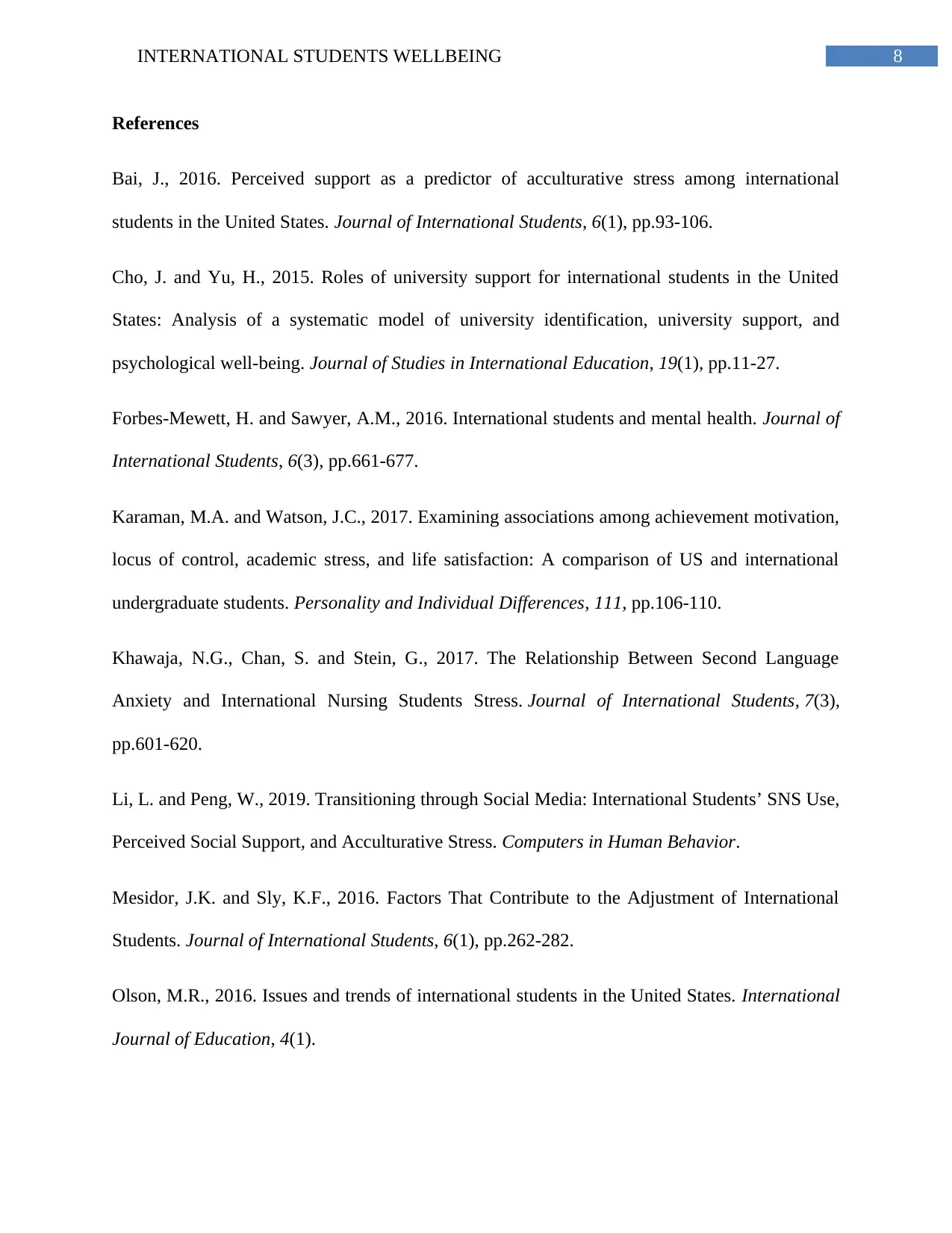
8INTERNATIONAL STUDENTS WELLBEING
References
Bai, J., 2016. Perceived support as a predictor of acculturative stress among international
students in the United States. Journal of International Students, 6(1), pp.93-106.
Cho, J. and Yu, H., 2015. Roles of university support for international students in the United
States: Analysis of a systematic model of university identification, university support, and
psychological well-being. Journal of Studies in International Education, 19(1), pp.11-27.
Forbes-Mewett, H. and Sawyer, A.M., 2016. International students and mental health. Journal of
International Students, 6(3), pp.661-677.
Karaman, M.A. and Watson, J.C., 2017. Examining associations among achievement motivation,
locus of control, academic stress, and life satisfaction: A comparison of US and international
undergraduate students. Personality and Individual Differences, 111, pp.106-110.
Khawaja, N.G., Chan, S. and Stein, G., 2017. The Relationship Between Second Language
Anxiety and International Nursing Students Stress. Journal of International Students, 7(3),
pp.601-620.
Li, L. and Peng, W., 2019. Transitioning through Social Media: International Students’ SNS Use,
Perceived Social Support, and Acculturative Stress. Computers in Human Behavior.
Mesidor, J.K. and Sly, K.F., 2016. Factors That Contribute to the Adjustment of International
Students. Journal of International Students, 6(1), pp.262-282.
Olson, M.R., 2016. Issues and trends of international students in the United States. International
Journal of Education, 4(1).
References
Bai, J., 2016. Perceived support as a predictor of acculturative stress among international
students in the United States. Journal of International Students, 6(1), pp.93-106.
Cho, J. and Yu, H., 2015. Roles of university support for international students in the United
States: Analysis of a systematic model of university identification, university support, and
psychological well-being. Journal of Studies in International Education, 19(1), pp.11-27.
Forbes-Mewett, H. and Sawyer, A.M., 2016. International students and mental health. Journal of
International Students, 6(3), pp.661-677.
Karaman, M.A. and Watson, J.C., 2017. Examining associations among achievement motivation,
locus of control, academic stress, and life satisfaction: A comparison of US and international
undergraduate students. Personality and Individual Differences, 111, pp.106-110.
Khawaja, N.G., Chan, S. and Stein, G., 2017. The Relationship Between Second Language
Anxiety and International Nursing Students Stress. Journal of International Students, 7(3),
pp.601-620.
Li, L. and Peng, W., 2019. Transitioning through Social Media: International Students’ SNS Use,
Perceived Social Support, and Acculturative Stress. Computers in Human Behavior.
Mesidor, J.K. and Sly, K.F., 2016. Factors That Contribute to the Adjustment of International
Students. Journal of International Students, 6(1), pp.262-282.
Olson, M.R., 2016. Issues and trends of international students in the United States. International
Journal of Education, 4(1).
⊘ This is a preview!⊘
Do you want full access?
Subscribe today to unlock all pages.

Trusted by 1+ million students worldwide
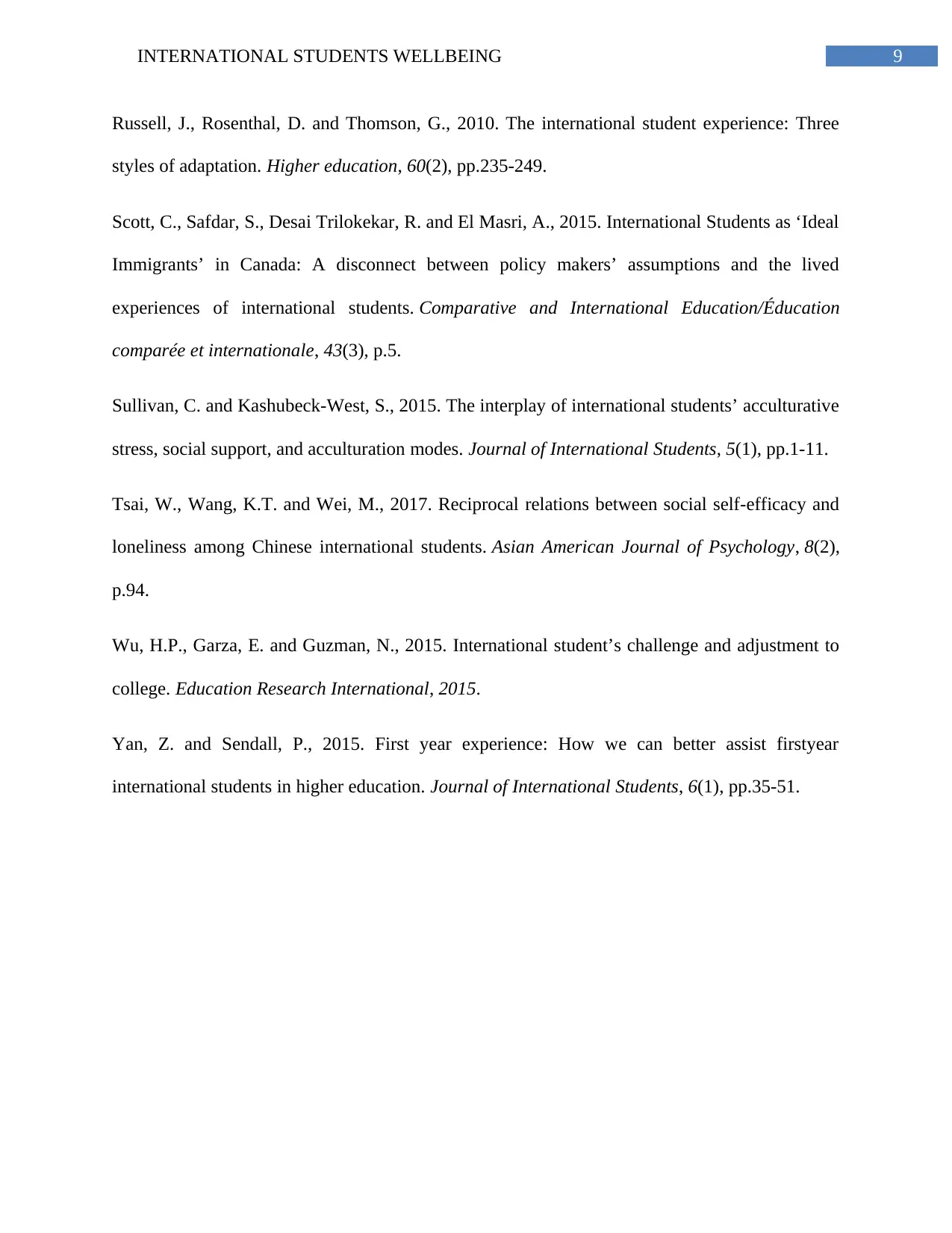
9INTERNATIONAL STUDENTS WELLBEING
Russell, J., Rosenthal, D. and Thomson, G., 2010. The international student experience: Three
styles of adaptation. Higher education, 60(2), pp.235-249.
Scott, C., Safdar, S., Desai Trilokekar, R. and El Masri, A., 2015. International Students as ‘Ideal
Immigrants’ in Canada: A disconnect between policy makers’ assumptions and the lived
experiences of international students. Comparative and International Education/Éducation
comparée et internationale, 43(3), p.5.
Sullivan, C. and Kashubeck-West, S., 2015. The interplay of international students’ acculturative
stress, social support, and acculturation modes. Journal of International Students, 5(1), pp.1-11.
Tsai, W., Wang, K.T. and Wei, M., 2017. Reciprocal relations between social self-efficacy and
loneliness among Chinese international students. Asian American Journal of Psychology, 8(2),
p.94.
Wu, H.P., Garza, E. and Guzman, N., 2015. International student’s challenge and adjustment to
college. Education Research International, 2015.
Yan, Z. and Sendall, P., 2015. First year experience: How we can better assist firstyear
international students in higher education. Journal of International Students, 6(1), pp.35-51.
Russell, J., Rosenthal, D. and Thomson, G., 2010. The international student experience: Three
styles of adaptation. Higher education, 60(2), pp.235-249.
Scott, C., Safdar, S., Desai Trilokekar, R. and El Masri, A., 2015. International Students as ‘Ideal
Immigrants’ in Canada: A disconnect between policy makers’ assumptions and the lived
experiences of international students. Comparative and International Education/Éducation
comparée et internationale, 43(3), p.5.
Sullivan, C. and Kashubeck-West, S., 2015. The interplay of international students’ acculturative
stress, social support, and acculturation modes. Journal of International Students, 5(1), pp.1-11.
Tsai, W., Wang, K.T. and Wei, M., 2017. Reciprocal relations between social self-efficacy and
loneliness among Chinese international students. Asian American Journal of Psychology, 8(2),
p.94.
Wu, H.P., Garza, E. and Guzman, N., 2015. International student’s challenge and adjustment to
college. Education Research International, 2015.
Yan, Z. and Sendall, P., 2015. First year experience: How we can better assist firstyear
international students in higher education. Journal of International Students, 6(1), pp.35-51.
1 out of 10
Related Documents
Your All-in-One AI-Powered Toolkit for Academic Success.
+13062052269
info@desklib.com
Available 24*7 on WhatsApp / Email
![[object Object]](/_next/static/media/star-bottom.7253800d.svg)
Unlock your academic potential
Copyright © 2020–2026 A2Z Services. All Rights Reserved. Developed and managed by ZUCOL.





